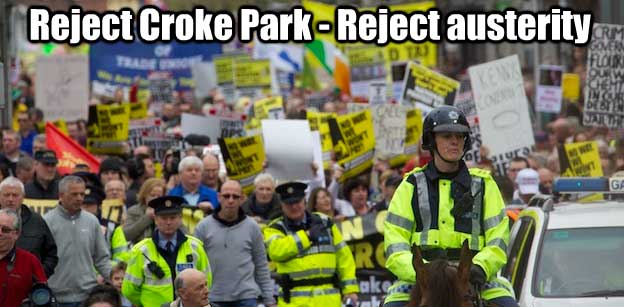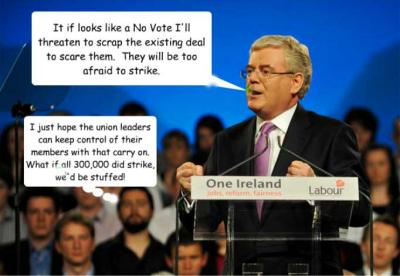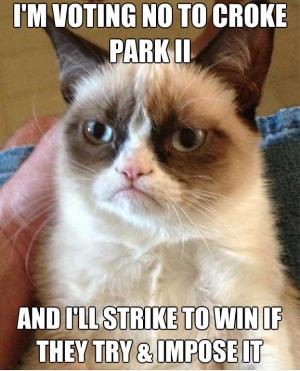Over 30 years of anarchist writing from Ireland listed under hundreds of topics
Why we said No to Croke Park Two

Vote NO to
- Further deterioration of the public services we all use
- A freeze in pay & increments
- A huge increase in hours for many workers & the subsequent loss of jobs
- The loss of 6 days holidays for many workers
- Unpaid overtime & cuts to overtime
- Restrictions on flexitime & work sharing
The points below outline why a NO vote on Croke Park II is only a start
1. The problem was entering into negotiations in the first place without having balloted union members in advance. Negotiations on the basis of accepting a one blllion euro cut out of the public sector were always going to have a bad outcome. There wasn't and better deal to be negotiatied on that basis.
2. Croke Park I resulted in the detetioration & loss of services to the public and CPII will only make this worse. Our campaign against it must explain the interests of unemployed and private sector workers in also opposing public sector cuts.
3. We need to argue against Croke Park II in the trade unions & workplace, we need to talk with work colleagues and work towards establishing workplace committees to plan out how to respond to cuts if they are implemented after we vote no.
4. A sustained strike is the only way to defeat austerity policies in general and is the needed response to build towards if they try and implement Croke Park II after we defeat it.
5. Large scale mass civil disobedience should be carried out alongside such a strike to maximise disruption to transport in particular. We need to forced the government to reverse austerity and not simply 'make our voices heard' in token if militant protest.

Articles about CPII
The Human Cost of Cuts to Public Services - Thoughts of a Public Sector Worker
Life in a social welfare office can be heartbreaking sometimes. Sitting there, behind the glass, you have a very limited range of available responses available to a broad expanse of problems. As the crisis deepens, people’s problems become more serious and varied and our responses and the time available to respond narrow.
Defeating Croke Park 2 – Every Vote Counts
An analysis of the voting results on the first Croke Park Agreement shows that the votes of a few hundred union members in a couple of unions could decide the fate of the ‘Croke Park Extension’ deal currently being voted on by union members. Because of the bizarre - and rather anti-democratic - system of voting at the public services committee of the ICTU, a small margin in favour or against the deal in any particular union swings all the votes of that union either for or against.
The Croke Park extension: What it is and how to fight it.
Early yesterday morning, the leadership of the public sector committee of ICTU emerged from talks with the government claiming they had achieved the best possible outcome from the negotiations. The best possible outcome in question involves extra hours at work, cuts in overtime rates and allowances for unsociable hours, delayed increments and revisions to flexitime arrangements and work-sharing patterns.
Was Croke Park “the best deal available?” And more importantly why?
INTO (Irish National Teachers Organisation) general secretary Sheila Nunan and other union leaders have said that the Croke Park extension deal is “the best deal available through negotiation” and that the negotiators “left nothing at the table”. And they are probably right. But saying that this is the best deal available through negotiation is not quite the same as saying that it is the best deal achievable.
Voting NO to Croke Park - what happens next?
The government says if we Vote no to Croke Park they will impose it anyway. Many of the union leadership try and scare us into voting Yes with this threat and by saying the only alternative is strike action. Both are right. If we just vote no than the government will attack us. And when they do the only way we can win is if we are willing to fight back - that will mean industrial action. It will almost certainly mean at least the credible threat of an indefinite strike.
SIPTU Croke Park recommendation shows the alternative is striking to win
It is no great surprise that the SIPTU NEC have recommended acceptance of Croke Park II. But in their statement they admit far more than the should have and point not only to why it should be rejected but also what is needed to win. That is the willingness to threaten effective industrial action aimed at bringing down the government if they attempt to impose Croke Park II after we vote no.
Croke Park proposal shows why we have to take our unions back & organise to win
It is quite incredible that the majority of the union leadership had the nerve to stay in the Croke Park talks and return to us, the members, asking us to vote for such a terrible deal. We have to ask ourselves how we have found ourselves in unions where the leadership was allowed take such an approach. And we have to work out how we create unions that we control and which will help us organise together to defend our common interests.
Croke Park II - the view from the north
The Croke Park 2 deal soon to be voted on in the republic will force all public sector workers there to accept 1 billion cuts to be delivered through wage cuts & longer working hours leading to fewer jobs. So far only a few unions balloting their members are calling for a NO vote to the extension of the Croke Park agreement. By most unions the deal is being sold as the only way to avoid worse cuts. Instead, a walkout and a indefinite strike is what needs to happen. Public sector workers can reclaim the Unions from so called realpolitik and keep hold of the hard won collective bargaining rights for workers not yet lost in Croke Park one.
Why you should vote no to Croke Park Two
The new Croke Park deal is a vicious attack on the pay and conditions of all Public Sector workers and their families by the Government. Shamefully our Trade Union leaders have allowed it to tear up an existing agreement that was due to run until June 2014 and have agreed to another one, which is significantly worse.
Why teachers should vote NO to Croke Park
The Croke Park Extension (CPX) represents an all-out assault on the pay, pensions and conditions of employment of teachers. It is the latest attack on workers whose pay has been cut by 14% - 30% since 2008. CPX reverses many gains made by teachers, that took decades to achieve.
As part of our campaign against Croke Park we have set up the We Defend our Public Services; We Defend our Pay & Conditions Facebook page to post and seek information. As part of that we are producing short simple graphics that you can share to your profile to make quick points about how bad Croke Park II is. Join the page & share graphics out like the Grumpy Cat one below.

.
Background articles
Understanding the roots of the crisis in Ireland - Bubble, Bailout and Backlash
On Tuesday the 7th of December, the Irish government were barricaded inside the parliament in Dublin. They were there to vote on a Budget implementing the cutbacks and austerity measures demanded of them by the IMF and ECB. The budget comes in a year of ever deepening crisis, as the debt of what was once Europe's fastest growing economy, spiralled out of control. The obvious question one is faced with is “What went wrong? What happened to this economic miracle?
The 1st Croke Park Agreement – the very antithesis of Larkin’s trade unionism
Next year, 2013, will mark the 100th anniversary of what many see as the most significant industrial dispute ever to have taken place in Ireland - the Dublin Lockout. The employers of Dublin, led by William Martin Murphy, locked out over 20,000 workers in an attempt to starve them into submission and to smash the increasingly popular Irish Transport and General Workers Union (ITGWU).
Reports from the pickets lines of the Nov 24th 2009 national strike
On 24 November 2009 250,000 public sector workers in Ireland took part in a national strike against planned pay cuts. Many WSM members who work in the public sector played a direct part in the organisation of the strike and student members helped organise solidarity actions at the universities where strikes were happening. They also toured other picket lines to send in reports and photos. Here we present these reports and the reports sent in by members on strike who had access to smart phones with which they sent live news on the day to the WSM twitter feed
Capitalist crisis and union resistance in Ireland
Late 2008 saw the Irish capitalist class wage a major ideological struggle against the Irish working class. They called for workers to bear the brunt of the capitalist crisis. Print media, TV and radio carried segment after segment where well-paid commentators argued that workers, in particular public sector workers, were earning too much, had overly generous pensions and that the public had unrealistic expectations of public services.
How we arrived where we are - a look back to 2009
Writing at the start of 2009 we warned that Our government has become more and more open about their plans for us. Cowen wants to drive down our living standards 12% and has already cut all our wages through the tax levy and slashed the wages of workers in the public sector further through the so called ‘pensions levy’. He openly talks of “four more years of even steeper cuts”.
Audio - An anti-capitalist and environmentalist perspective on the Euro crisis
Paul Bowman gives a 40 minute presentation on the Euro as a moment of the internationalisation of capital and looks for a way of dealing with the crisis that goes beyond the alternative models of capital being argued for by the left. If the height of a crisis is not the moment to raise a discussion of an anti-capitalist alternative then when is? Beyond this he also warns against the stagest approach much of the left has adopted where the economic crisis is to be addressed first by a demand for growth and the environmental crisis ignored till later.
This is what you see when you feed the Croke Park II 'Appendix on Working Hours' into word cloud generating software

Get more updates, comment and share ideas on the
We Defend our Public Services; We Defend our Pay & Conditions
Facebook page

